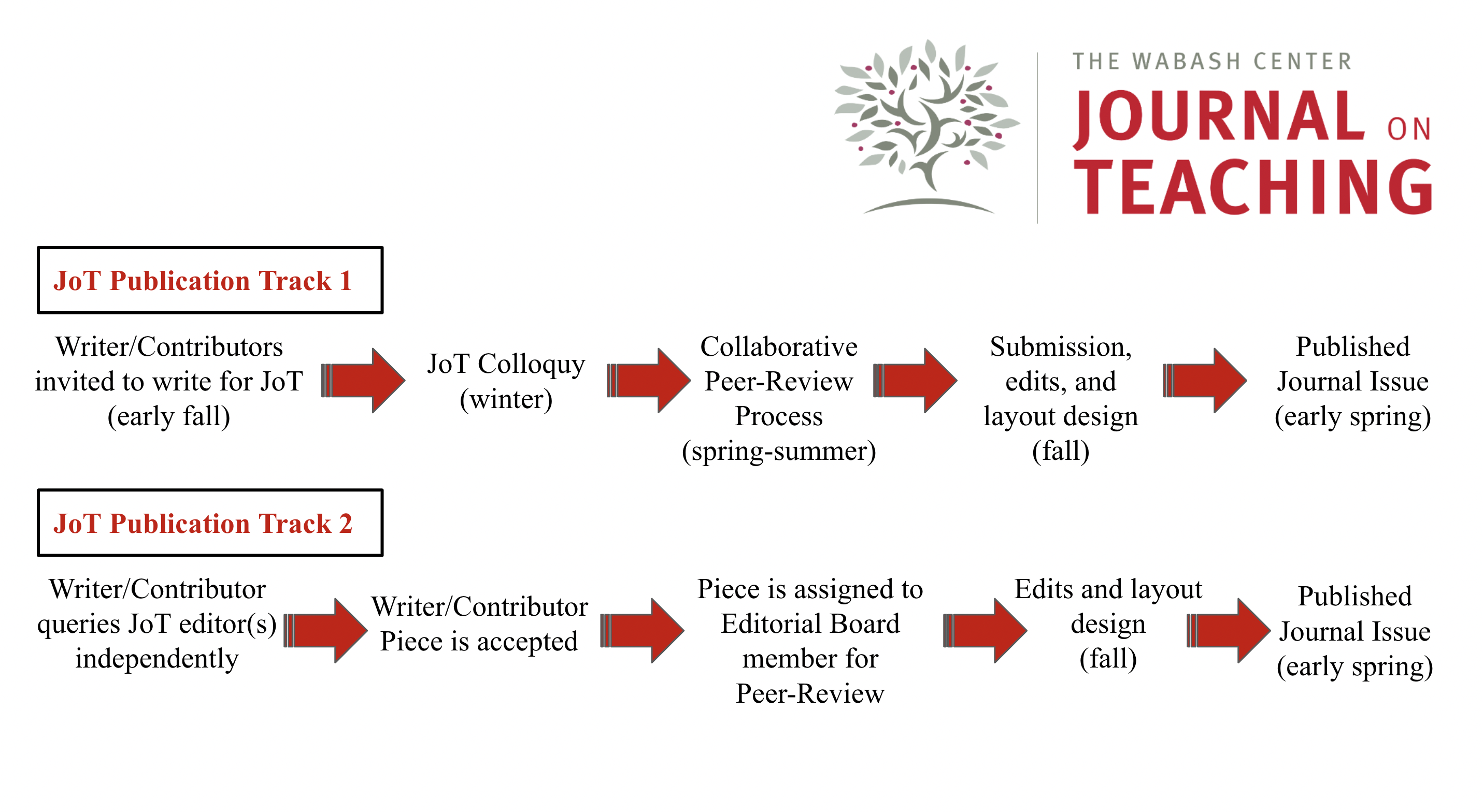Writing/Contributing
The Journal on Teaching (JoT) is an annual peer-reviewed periodical from the Wabash Center. Each issue is theme-driven and includes various forms of media—such as articles, poetry, visual art, videos of performing arts, and music—in service to critical reflection on teaching and the teaching life. We aim to expand the traditional boundaries of academic writing, while remaining focused on the scholarship of teaching in the fields of religious and theological studies. We are committed to publishing creative and analytical reflections on the teaching practice. The journal offers space for scholars and educators to identify challenges, reflect on experiences, and innovate new pedagogical approaches.
We do not have an open reading period for submissions. There are two publication tracks.
One is a collaborative generation, composition, and review of a piece. The other is a review of a submission crafted independently. JoT is modeling a change in scholarship by utilizing a collaborative peer-review process. Writers/Contributors are invited by the Wabash Center to participate in our collaborative Peer-Review process, beginning with a writing colloquy held in the winter. In the JoT Writing Colloquy, authors participate in mutual workshopping of their work, dialogue about the craft of writing, consider ways of making their potential article submissions multi-modal, and have opportunity for writing coaching beyond the workshop. We expect that Writers/Contributors who participate in the colloquy will submit a piece for publication in the journal.
Before the JoT Writing Colloquy
In preparation for participation in the colloquy, participants are encouraged to bring a piece of writing on the theme of the upcoming JoT volume. This might include an abstract, a detailed outline, some verse or a page of thoughts on the theme.
During the JoT Writing Colloquy
Participants respond to various writing exercises, consider the merits of various genres of writing, and exchange feedback with their colleagues. They also have the opportunity to have one-on-one meetings with professional writing coaches, and time to begin developing their article/piece for JoT.
After the JoT Writing Colloquy
In our efforts to make the journey to publication more collaborative and supportive, following the colloquy each Writer/Contributor is paired with a member of the JoT Editorial Board, or a colleague beyond the Board. These colleagues serve as Conversation Partners. Over the course of six months, these Conversation Partners meet regularly with Writers/Contributors to discuss the piece and offer feedback before our submission deadline each August.
While publication in the journal is not guaranteed, participation in the colloquy, as well as working with a Conversation Partner, greatly increases the likelihood of acceptance.
Submission of Article
Once submitted, the manuscript will be edited for publication. Similar to other journal submission processes, editors will inform authors of recommended changes to the article. The JoT editors will determine which submitted articles will be published and inform the author of the publication date as well as the deadline for final edited submissions.
As stated earlier, submissions authored by persons who do not participate in the JoT Writing Colloquy may be considered. These pieces will be reviewed by members of the Editorial Board who may suggest edits for the submission to be accepted for publication. Independently submitted articles and pieces most likely to be published are those that lend themselves to the cohesive theme of the pending journal volume and those that make use of embedded multimodal materials.
Send queries to: Donald E. Quist, Editor, quistd@wabash.edu. Please note, preference and priority are given to colloquy participants. Pieces are accepted for track 2 on a rolling basis.
Future Themed Issues:
- 2026 - "Spirit - Vol. 7."
- 2027 - "Perseverance - Vol. 8."
- 2028 - "Dreams/Visions/Nightmares - Vol. 9"
- 2029 - "Where Are You From?: Immigrant Pedagogies - Vol. 10"

|
The full content of this open-access journal is freely available online -- free both for authors and readers. Authors retain full copyright of their published manuscript. Our partnership with Atla ensures that the journal will have the broadest professional exposure and apply industry standards for online publications. Submissions to the journal must be original work. The journal will immediately reject papers determined to be plagiarized or self-plagiarized. Read More. This publication is archived to the current standard of preservation and disaster recovery best practices utilizing online and off line backups at secure on site and off site locations. We welcome manuscripts that take advantage of the online digital medium. |
|---|
